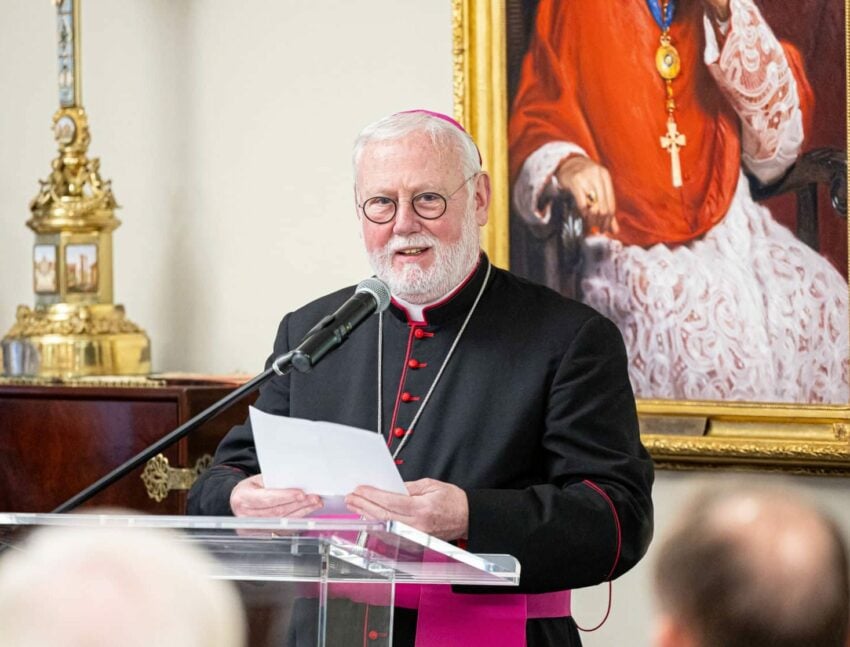
Religious freedom is not merely a human right or moral imperative but is also a path to promoting peace in an increasingly complex world, said the Vatican’s Secretary for Relations with States Archbishop Paul Gallagher in a lecture in Sydney on 6 November.
Archbishop Gallagher was touring Australia for a week-long visit to celebrate the 50th year of diplomatic relations between Australia and the Holy See.
In a lecture hosted by the Australian Catholic University the 69-year-old archbishop, who served as apostolic nuncio from 2012-2014, spoke on the role of religious freedom in promoting harmony and peace, resolving conflicts and preventing religious extremism and violence at a time when forced migration due to religious discrimination has reached “unprecedented levels”.
Despite religion being blamed for many current-day conflicts, he argued that authentic religious freedom with its respect for diversity and the human person, is a powerful social cohesive, preventing radicalisation and fostering co-operation and conflict resolution at local and international levels.
As such, well-defined legal frameworks for protection of belief and the ability to act on one’s belief are “essential.”
“Sadly, throughout history and continuing into the present day, religion instead of being a harmonious force has become a driving force in many political disputes,” Archbishop Gallagher said.
“Furthermore, religious extremism, territorial disputes with religious significance, discrimination against religious minorities and the role of religious leaders are all contributing factors in the complex landscape of religiously-motivated conflicts.
“In this regard, Pope Francis often describes the current state that we live in as a third world war being fought piecemeal, and affirms that no civilised society can be built without repudiating every ideology of evil, violence and extremism that presumes to suppress others and annihilate diversity by manipulating and profaning the sacred name of God.”
“At the same time there is a deep conviction, especially among people of faith, that religious freedom has a generous role to play in transmitting hope while also offering the promise of peace, mutual understanding and eventual conflict resolution in our increasingly complex and interconnected world.”
The archbishop gave the 1998 Good Friday agreement as one example where respect for religious freedom played a peace-making role in ending long-standing sectarian violence in Northern Ireland.
Archbishop Gallagher was apostolic nuncio to Australia from 2012-2014.
Attending his lecture at ACU were Australia’s Ambassador to the Holy See Chiara Porro, the current Apostolic Nuncio Archbishop Charles Balvo, Executive Director of the National Catholic Education Commission Jacinta Collins, senior leaders of the university, members of clergy and representatives of other Catholic institutions.
Archbishop Gallagher was scheduled to meet with the Minister for Trade, Tourism and Investment Don Farrell and Minister for Foreign Affairs Penny Wong, Governor-General of Australia David Hurley as well as Catholic and Indigenous leaders during his visit from 4-9 November to Sydney, Canberra, Melbourne and Perth.
In a formal response to the archbishop’s lecture, director of the PM Glynn Institute Dr Michael Casey offered a short critique of “technocratic societies” such as Australia’s, which deny the religious dimension of human existence.
With the Federal Government yet to develop its own religious freedom proposals, the future of religious freedom remains unresolved, he said.
Locating protections at the Commonwealth level within anti-discrimination law in the form of exemptions and exceptions obscures religious freedom as a positive right and “lends itself to mischaracterisation as some sort of dubious concession of governments to an interest group rather than as a means to protecting a fundamental human right.”
“A fear often arises from an assumption that religious communities are inherently discriminatory and use religious freedom as a pretext to protect their allegedly discriminatory beliefs and practices,” Dr Casey added.
